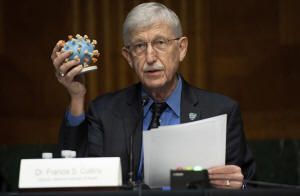Renowned geneticist Francis Collins retires from NIH, urging 'respect'
for embattled workers
[March 03, 2025]
By LAURAN NEERGAARD
WASHINGTON (AP) — Dr. Francis Collins, a renowned geneticist and former
longtime director of the National Institutes of Health, announced
Saturday that he has retired, leaving an agency being upended by budget
cuts and layoffs.
Collins — a guitar-playing researcher and evangelical Christian known
for finding common ground between religion and science — gave no reason
for his abrupt departure. He issued a statement that he’d been honored
with a long career at an agency “rightfully called the crown jewel of
the federal government for decades.”
He came to the NIH in 1993 to lead the Human Genome Project, which in
2003 completed mapping the human DNA instruction book — two years ahead
of schedule and $400 million under budget, Collins noted in his
statement Saturday.
Collins, 74, was the NIH’s director for 12 years and under three
presidents — Barack Obama, Donald Trump and Joe Biden.
Collins stepped down from that position in October 2021 to return to his
research laboratory, overseeing scientists studying diabetes and a
genetic aging disorder. He also advised Biden on how to combat hepatitis
C.

The $48 billion NIH is the largest funder of biomedical research and has
long had strong bipartisan support.
NIH employees “are individuals of extraordinary intellect and integrity,
selfless and hard-working, generous and compassionate. They personify
excellence in every way and they deserve the utmost respect and support
of all Americans,” Collins wrote.
In a text message, Collins declined an interview. His retirement had
taken effect on Friday.
[to top of second column]
|

Dr. Francis Collins, Director of the National Institutes of Health (NIH),
holds up a model of COVID-19, known as coronavirus, during a Senate
Appropriations subcommittee hearing on the plan to research,
manufacture and distribute a coronavirus vaccine, known as Operation
Warp Speed, Thursday, July 2, 2020, on Capitol Hill in Washington.
(Saul Loeb/Pool Photo via AP, File)
 But his statement defended an agency
in turmoil under the new Trump administration’s funding policies and
the recent firings of more than 1,000 workers.
“When you hear about patients surviving stage 4 cancer because of
immunotherapy, that was based on NIH research over many decades.
When you hear about sickle cell disease being cured because of
CRISPR gene editing, that was built on many years of research
supported by NIH,” Collins wrote.
Early in his career, Collins discovered the gene that causes cystic
fibrosis, which helped lead years later to effective treatment for
the lung disease. He credited the discovery to an NIH grant
supporting his research at the University of Michigan.
Later, as NIH’s director, he oversaw work to understand and fight
serious diseases such as cancer, Alzheimer’s, diabetes and COVID-19,
including vaccines against the coronavirus that have saved millions
of lives.
Aside from his NIH work, Collins is known widely for writing on the
intersection of religion and science.
All contents © copyright 2025 Associated Press. All rights reserved
 |